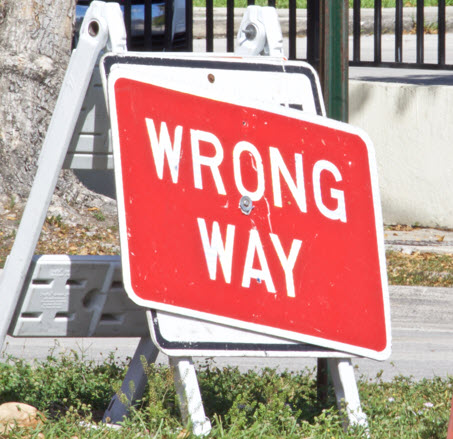One of my favorite lines in Planes, Trains and Automobiles is when a car barrels down the highway in the wrong direction, and a frantic husband and wife scream, “You’re going the wrong way!”
Instead of heeding the warning, the driver (John Candy) and passenger (Steve Martin) dismiss them, saying, “How would he know where we’re going?”
Wouldn’t it be nice if a giant “wrong way” sign appeared whenever feedback was misinterpreted, poorly communicated, ignored, or dismissed?
Unfortunately, in the workplace, there are no flashing lights—just missed opportunities, confusion, and collectors continuing down the wrong path.
Offering Guidance Not Just Pointing Out Mistakes
Providing effective feedback isn’t just about pointing out mistakes.
It also includes offering guidance on how to correct the issue and prevent it from happening again.
Simply telling a collector they did something wrong without giving them the tools to improve is like shouting “You’re going the wrong way!” without explaining how to turn around.
Constructive Feedback Should Be Clear, Actionable, and Solution-Oriented
For example, instead of simply handing a collector a scorecard stating, “You mishandled the call,” and requiring them to sign an acknowledgment, a more effective approach is to play the call during a feedback session. This allows the collector to first reflect on how the call could have been handled differently, followed by constructive input from the manager.
For instance, the manager might say, “You interrupted the customer several times, which escalated the situation. Next time, try pausing for a few seconds before responding to ensure they feel heard.” This method not only highlights the issue but also provides a clear, actionable strategy for improvement, fostering a learning-focused environment rather than a punitive one.
A Highly Effective Approach
When collectors worked in the office, they learned from each other by overhearing how other collectors handled different scenarios. With the shift to remote work, this valuable learning opportunity was lost, making it crucial to find alternative ways to share insights and refine strategies.
One highly effective approach is monthly call calibration sessions with the entire team.
While managers initially worried about how collectors would feel having their calls analyzed, the response was overwhelmingly positive—collectors actively requested their calls be included, to gain fresh perspectives and new techniques.
Creating Opportunities for Collectors to Learn
Creating opportunities for collectors to learn from one another is essential for growth and success.
Call calibration sessions provide a structured way to analyze real interactions, exchange ideas, and continuously improve. By fostering a culture of collaboration and shared learning, creditors and agencies can enhance collector performance, strengthen compliance, and drive better results.
Additional Training and Blogs Available Regarding Call Monitoring
If you need some training assistance for your team, you may want to consider:
Bump It Up! Your Collections Success-Virtual Training for Your Team, taught by Ken Evancic.
For more insights on call monitoring, be sure to check out these additional blogs:
Sample Size for Oversight – Call Monitoring,
Transforming Customer and Collector Interactions with Call Monitoring
and
Mastering Call Calibration: Elevating Service Quality and Driving Success

Author: Bev Evancic
Bev.Evancic@ResourceManagement.com

Bev Evancic is a Senior Vice President at Resource Management Services, Inc. Prior to employment at RMS, Bev worked as the Collection and Recovery Manager at AT&T Universal Card, Citi, and Federated Department Stores. Bev started in the collection industry as a collector at an upscale clothing store in Cincinnati, Ohio. As a returned check and private label credit card collector, Bev gained a basic understanding of the collection industry that has not changed with the introduction of regulations. Her collection philosophy begins with the idea that businesses and customers benefit from preserving the customer relationship. First, collectors need to attempt to contact customers when it is convenient for the customer to discuss his/her financial condition and willingness/ability to pay. Second, you never collect money by intimidating or threatening customers. Third, businesses must make sure the debt is valid.
She has managed all phases of collection and recovery operations, including automated dialer units, bankruptcy, and legal units, skip tracing units, internal collections, outside collection agency networks, and Consumer Credit Counseling. As a Consultant for Resource Management Services, Inc., Bev has spearheaded collection and recovery best practices reviews for many top credit grantors. Her articles on dialer operations, agency management and bankruptcy best practices have been widely publicized.
She is well known and regarded as a specialty expert in the areas of: Repossession, Bankruptcy, Estate, Litigation, as well as Pre- and Post- Charge-off. Prior to joining Resource Management Services, Inc. in 1995, Bev managed the Recovery Department for AT&T Universal Card Services where she developed the bankruptcy, probate, internal and litigation processes.
She is the author of “Recovery Management: Collecting the Uncollectible Account.”
Sign Up for the Twice Monthly Newsletter
Just enter your email address at the top orange bar at:
Collection Compliance Experts – “The Power of Expertise: Oversight Perfected”
It’s that easy! Twice a month – we provide blog updates and Resources for the Collection and Industry Professional.
Your email is just for this newsletter. We never sell your information. No fee. Opt-out at any time.





